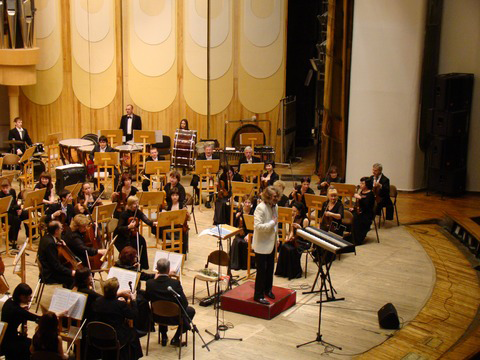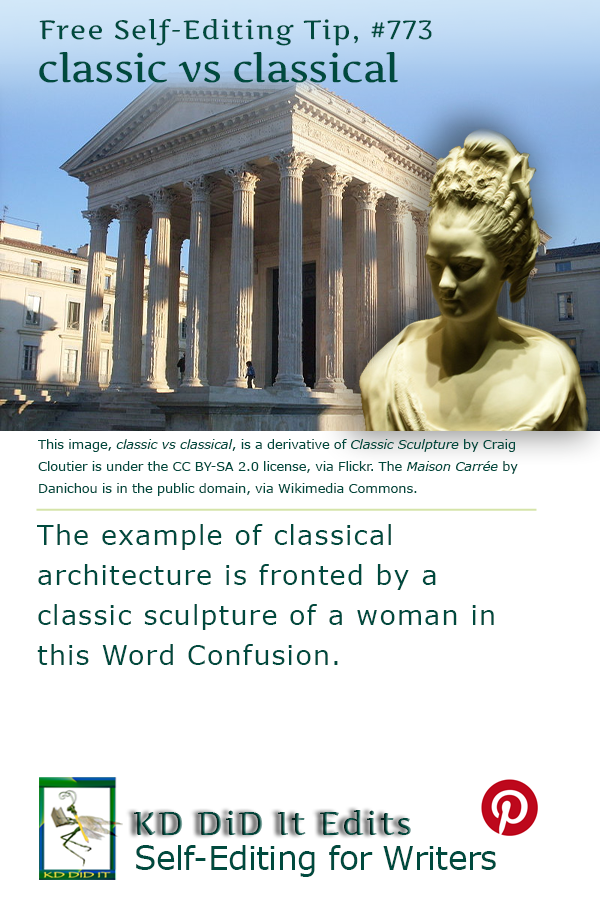There is a reason why classic and classical both refer back to the ancient Greeks and Romans, primarily because Greek civilization influenced the Romans who spread their influence (and civilization) throughout the Mediterranean and Europe. This influence “provided the foundation of modern Western culture and is considered the cradle of Western civilization” (Ancient).
The difference between classic and classical is that classic is timeless and of the finest quality or a prime example of whatever you’re comparing.
It’s also why the study of Greek and Latin languages and their literatures is referred to as the classics — and such courses may be listed as Classics — is because of this initial influence.
Classical indicates that you’re referring back to the traditions, styles, and influences of the ancient Greeks and Romans. Pursuing a classic education involves exposing the student to classical literature, history, and languages, especially Latin and Greek. Another example is Palladian architecture influenced by a fourteenth century Italian architect who was, in turn, influenced by classical styles of the ancient Greeks and Romans.
“Great art is considered classic, not classical, unless it is created in the forms of antiquity” (Oxford). An exception to this “rule” is classical music, which is “marked by formal, sophisticated, extended compositions” of the late eighteenth century (Classic, Classical).
Word Confusions . . .
. . . started as my way of dealing with a professional frustration with properly spelled words that were out of context in manuscripts I was editing as well as books I was reviewing. It evolved into a sharing of information with y’all. I’m hoping you’ll share with us words that have been a bête noire for you from either end.
If you found this post on “Classic versus Classical” interesting, consider tweeting it to your friends. Subscribe to KD Did It, if you’d like to track this post for future updates.
| Classic | Classical |
|---|---|

Classic Cars by Nathan Filz is under the Pixabay License, via Pixabay. |

Symphony Orchestra is under the CC0 license, via PxHere. — Orchestras generally play classical music. |
| Part of Grammar: | |
| Adjective; Noun
Plural for the noun: classics |
Adjective |
| The best in its class
Adjective: Judged over a period of time to be of the highest quality and outstanding of its kind
Remarkably and instructively typical Noun:
[Classics] A school subject that involves the study of ancient Greek and Latin literature, philosophy, and history
A major sports tournament or competition, as in golf or tennis [UK] Each of the five main flat races of the horse-racing season |
Traditions going back to the ancient Greeks and Romans
Relating to ancient Greek or Latin literature, art, or culture
[Typically of a form of art] Regarded as representing an exemplary standard
|
| Examples: | |
| Adjective: The Catcher in the Rye is considered a classic novel, but not by me. A Duesenberg is a classic car. This classic navy blazer is almost a must-have for anyone . . . unless you look terrible in navy blue! Hamlet is the classic example of a tragedy. Oh, man, I had all the classic symptoms of flu. John Ford directed many classic Westerns. The study of Greek and Latin languages and their literatures is a study of the classics. A couple of hours classic skiing in the morning is my winter alternative to a long trail run. Noun: The little black dress is considered a classic. He’s hoping that tomorrow’s game will be a classic. She took an honors degree in Classics. Even so, solid grounding in the Latin classics was still regarded as the essential foundation of a superior education. John Stuart Blackie (1809–1895) was a Professor of Greek at Edinburgh who wrote a pamphlet that reflects Blackie’s own forward-thinking on the matter of language pedagogy and the relationship between classicists and contemporary Greece (Hanink). Dozens of celebrity golfers attended the Bob Hope Desert Classic. His sire had won the Classic in ’98. |
Bulfinch’s Mythology was a highly successful popularization of classical Greek mythology for English-speaking readers.
As a reaction to the Middle Ages, in the early Renaissance, there was a strong focus on a classical education consisting of Greek, Latin, the classics, and art. Leonardo da Vinci’s Vitruvian Man was influenced by Vitruvius, a Roman architect whose style has become classical. There are several ballet styles, including classical ballet, which is known for its aesthetics and rigorous technique; its flowing, precise movements; and, its ethereal qualities. Classical mechanics studies many different types of motion, including translational motion, rotational motion, oscillatory motion, and circular motion. Newtonian physics is also about classical mechanics with three laws of motion, the most famous of which is that for every action, there is an equal and opposite reaction. Classical physics evolved into quantum physics. A classical education exposes a student to classical literature, history, and languages, especially Latin and Greek. |
| Derivatives: | |
| Noun: classicist | Adjective: classicizing Adverb: classically Noun: classicism, classicist Verb: classicism, classicality, classicize |
| History of the Word: | |
| Early 17th century, from the French classique or the Latin classicus meaning belonging to a class or division, later of the highest class, from classis. | Late 16th century, in the sense outstanding of its kind and is from the Latin classicus meaning belonging to a class + -al. |
C’mon, get it out of your system, bitch, whine, moan . . . which words are your pet peeves? Also, please note that I try to be as accurate as I can, but mistakes happen or I miss something. Email me if you find errors, so I can fix them . . . and we’ll all benefit!
Satisfy your curiosity about other Word Confusions on its homepage or more generally explore the index of self-editing posts. You may also want to explore Book Layout & Formatting Ideas, Formatting Tips, Grammar Explanations, Linguistics, Publishing Tips, the Properly Punctuated, Writing Ideas and Resources, and Working Your Website.
Resources for Classic versus Classical
“Ancient Greece.” Wikipedia.org. Web. 26 April 2019. Accessed 4 May 2019. <https://en.wikipedia.org/wiki/Ancient_Greece>.
Apple Dictionary.com
“Classic, Classical.” GrammarBook.com. Web. n.d. Accessed 4 May 2019. <https://www.grammarbook.com/homonyms/classic-classical.asp>.
Hanink, Johanna. “On the Living Language of the Greeks and Its Utility to the Classical Scholar: John Stuart Blackie, 1853.” Medium.com Web. 8 April 2017. Accessed 4 May 2019. <https://medium.com/@johannahan/on-the-living-language-of-the-greeks-and-its-utility-to-the-classical-scholar-c029f2f260f7>
Oxford Dictionaries: classic
Pinterest Photo Credits:
Classic Sculpture by Craig Cloutier is under the CC BY-SA 2.0 license, via Flickr. The Maison Carrée by Danichou is in the public domain, via Wikimedia Commons.


